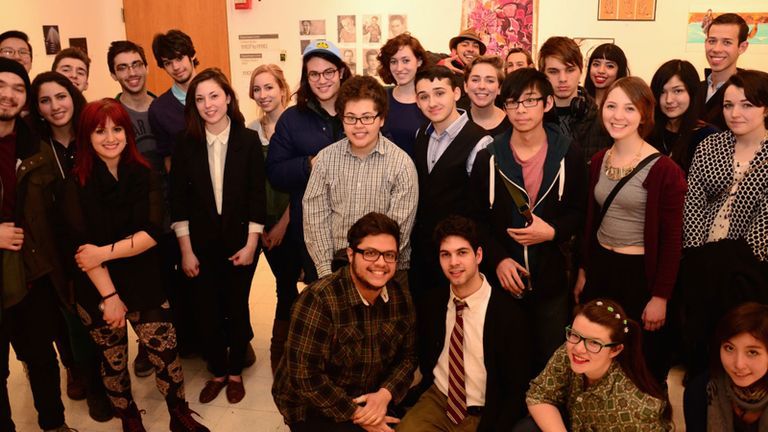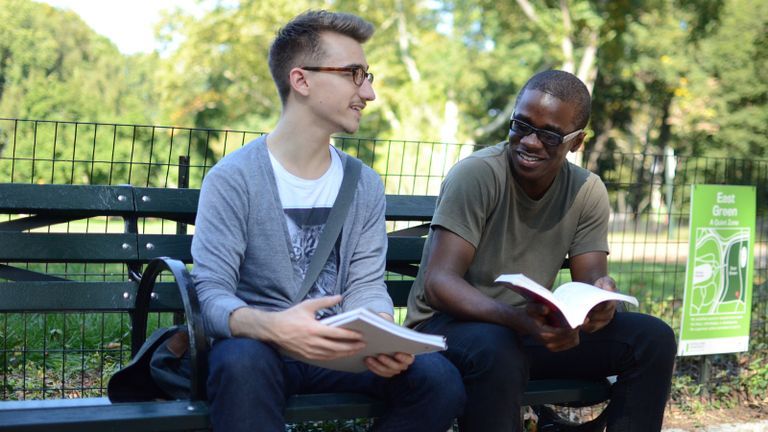Frequently Asked Questions
How can I find out who the advisors are, and when can I meet with one of them?
Office hours are posted on the Department office, on professors' office doors, and on the department website. Please visit our departmental advising page for a current advising schedule.
I'm trying to register for a philosophy course, but the system won't let me because it says I'm missing a prerequisite. What should I do?
The solution depends on the prerequisite and your particular circumstances. Consult an advisor right away.
I really want to take a course that's offered this semester, but the class is full. What should I do?
You should speak directly with the professor teaching the course. Advisors may not overtally courses of other faculty members. Enrollment limits are established to preserve the integrity of the course. When you endeavor to exceed that limit you potentially compromise the quality of the course not only for others but also for yourself. Consider taking the course in a different semester.
I've never taken a philosophy class, and I don't really know what it is about. Can you tell me, in a nutshell, what philosophy is?
Some might say that anything that can be put in a nutshell belongs there. Hunter's philosophy courses treat a vast array of topics and ways of addressing them. Still, there are some general features of philosophy that can be described. Philosophy studies the most fundamental questions that human beings ask—about individual and social action, the possibility and limits of knowledge, the truth and justification of beliefs, human nature and freedom, the existence of God, and the operations of nature. Philosophy approaches these questions in a systematic way, and philosophers have worked out more or less comprehensive theories to answer them (or show why they cannot be answered).
I took one (or more) philosophy class(es), and I'd like to take more. How should I decide what to take next?
Your instructors are good sources of advice for classes that are related to the courses you have already completed. You may also access additional information about specific offerings at this site. Department advisors are also an excellent resource. They will discuss your interests and background in an effort to match you with an appropriate course.
I'm supposed to write a paper for my philosophy course, and I'm having trouble. How can I get some extra assistance?
Your first resource for additional assistance with specific assignments is your own instructor. She or he best knows the expectations for the assignment and how the materials you have discussed in class relate to it. Your professor can also direct you to other resources. To help you out, we have also created a document with extensive paper writing tips.
If you need more assistance with a specific writing project, feel free to consult with our tutors.
How can I find out what I still need to do in order to complete my major?
The requirements for the "standard concentration" to the philosophy major (The Standard Major & Minor Concentration) and the "new philosophy, politics, society (PPS) concentration" to the philosophy major (The New Major & Minor Concentration in Philosophy, Politics, & Society) can both be found in the Hunter College Undergraduate Catalog. You may compare your own transcript with the requirements specified in the catalog.
You are also strongly encouraged to speak directly with an advisor if you have additional questions. All students are strongly advised to meet with an advisor at least three semesters prior to graduation and then again two semesters prior to expected graduation, specifically to determine whether all departmental requirements for the major and minor have been met. To determine your standing regarding requirements other than the major, visit the Hunter College Department of Advising to request a degree audit.
How can I find out what I need to do to complete my minor?
Hunter College has made the minor optional for students. Students may forego the minor, if they wish. However, if students wish to have a minor, the department in which the student wishes to minor now determines the requirements for the minor. It is no longer the major department that determines the requirements for the minor.
If you are pursuing a minor in philosophy, you must check with the philosophy department to obtain its requirements for the minor. Be sure to speak with an advisor in the philosophy department if and when you have questions regarding the minor.
I need a course to graduate with my Philosophy major but it isn't offered this semester. What can I do?
Fortunately, this situation does not often arise, since the Philosophy Department frequently offers most of its core major requirements on a regular basis. However, it is simply not possible to offer every required course every single semester. Students should be mindful of the required courses they need to graduate (e.g., PHILO 170, PHILO 212, PHILO 215) and should endeavor to complete them prior to their final semester. In the unlikely event that a course has not been available for some time, arrangements for completing the requirement should be made with a department advisor.
I failed one (or more) of my philosophy courses. Does it still count toward my major?
Unfortunately, it does not.
I'm a transfer student, and I took philosophy courses at my other school. When I received my transcript from Hunter, it designates "see department" next to some of my courses. What do I need to do?
You may have your courses evaluated for their Hunter equivalency by visiting a department advisor during office hours, but note that you need to do this only if you wish to have the course count for a specific requirement or if you need the course as a prerequisite for another course for which you are trying to register. Otherwise, the transcript will reflect that you have been granted the credits, and the course or courses will count toward your electives.
To complete the equivalency evaluation process, you'll need:
- a copy of your Hunter transcript,
- a description of the course, either from the syllabus or the college catalogue, and
- a Hunter "Course Equivalency Form" (available on the table in front of the Philosophy Department office). You should bring all of these documents with you when you visit a department advisor.
It is strongly recommended that you discuss these matters with a representative from Student Services prior to seeking course equivalencies, because some courses might be equivalent to multiple Hunter offerings. Student Services will be in the best position to evaluate your transcript as a whole and to advise you how to maximize your existing credits for meeting Hunter requirements.
I'm a transfer student, and I took many philosophy courses at my other school. What do I need to do to receive my Philosophy degree from Hunter?
You should speak directly with an advisor as soon as possible to ascertain which of your courses will fulfill departmental requirements. A maximum of 12 credits from other institutions may be utilized in pursuit of your Philosophy degree at Hunter. An advisor can discuss your interests and plans with you, and will assist you with maximizing the credits you have earned.
I'm thinking about majoring in philosophy, but I'm not sure what I would do after I graduate. What do philosophy majors do once they graduate?
Philosophy majors pursue a variety of careers just like those who major in other liberal arts areas. In recent years, Hunter Philosophy majors have gone on to careers in education, business, law, medicine, the arts, and a variety of other fields. Philosophy prepares students to do many things and provides them with the thinking and writing skills that prepares them better than many other fields. Philosophy enables students to think critically, solve problems, understand matters from different points of view, and communicate effectively. Department advisors welcome the opportunity to discuss these concerns with students.
I'm approaching graduation, and I'm not sure what kind of job I should seek. What should I do next?
Begin by going to Career Development Services. They can provide you with scholarship information, graduate school advice, and information about job opportunities in the area. Department advisors are also available to discuss this sort of concern.
I'm approaching graduation, and I'm not sure what to do next. How do I decide whether to go to graduate school?
Meet with one of the faculty members designated as advisors right away. Contact them by email to request an appointment. In your message, be sure to include days and times that you are available.
I'm thinking about going to graduate school in philosophy. What should I do, and when?
You are strongly encouraged to discuss any prospective graduate school plans with a member of the faculty at least three semesters prior to your expected graduation. Professors Press and Acampora have presented workshops for students considering graduate school. Their notes and tips are available on-line, and both are available to discuss these matters with interested students.
I'm a philosophy major, but I'm thinking about going to graduate school in a different area. What should I do?
You should first learn more about the specific programs in which you're interested. You can do that by exploring different schools on the internet and by consulting with advisors in the Hunter department that is most closely related to the subject you wish to pursue. Your Philosophy advisors may be able to suggest particular programs for you to investigate and direct you to other resources.
I need a letter of recommendation. Will the Philosophy Department supply one?
Letters of recommendation are written by individual faculty members. Students should speak with faculty members with whom they have taken courses to request such letters. It is advisable that you plan ahead for these circumstances.
Recommendations for graduate school, for example, should be sought at least three months prior to when you need to submit your application. If you anticipate needing letters of recommendation for scholarships, graduate school applications, or employment purposes, get to know your faculty members during your stay at Hunter and visit them during their office hours.










